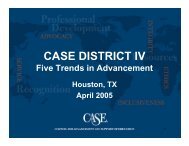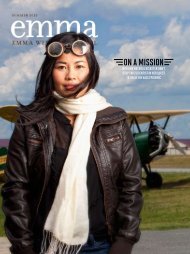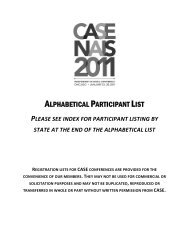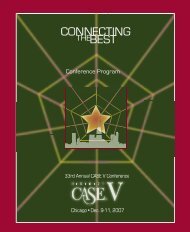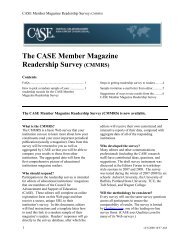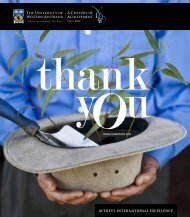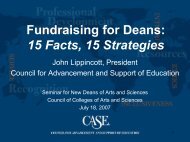Create successful ePaper yourself
Turn your PDF publications into a flip-book with our unique Google optimized e-Paper software.
Answering Ovid<br />
recent books by <strong>Kenyon</strong> authors<br />
Michael Berryhill ’67, The<br />
Trials of Eroy Brown: The Murder Case That<br />
Shook the Texas Prison System (University<br />
of Texas Press). Chair of the journalism<br />
program at Texas Southern University,<br />
Berryhill recounts the story of a Texas<br />
prisoner who killed two prison officials,<br />
pleaded self-defense, and finally won<br />
acquittal—but who remained in jail. “It was<br />
a tragedy that needn’t have happened,”<br />
writes Berryhill, “but it also became a<br />
signal moment in the history of prison civil<br />
rights, revealing everything that can go<br />
wrong in prisons.”<br />
Sarah Blick and Laura D. Gelfand,<br />
editors, Push Me, Pull You: Imaginative and<br />
Emotional Interaction in Late Medieval<br />
and Renaissance Art (Brill). Two volumes<br />
offer essays on “the layered relationships<br />
. . . between devotional objects and those<br />
who interacted with them.” Blick is a<br />
member of <strong>Kenyon</strong>’s art history faculty.<br />
Simone Dubrovic and Daniela<br />
De Pau, editors, Zoom d’Oltreoceano:<br />
Istantanee sui registi Italiani e sull’Italia<br />
(Vecchiarelli Editore). Dubrovic, of the<br />
Italian faculty, and his co-editor have<br />
assembled interviews with leading Italian<br />
film directors, by Italian scholars working<br />
in the U.S. The aim is to engage these two<br />
perspectives in an exploration of Italian<br />
identity and a changing Italy.<br />
Larry Enright ’72, A King in<br />
a Court of Fools. In this enjoyable novel<br />
of 1950s America, Enright spins out the<br />
adventures of sixth-grader Tom Ryan and<br />
his “gang,” as told by little brother Harry.<br />
Klondike bars, drive-in movies, Isaly’s<br />
dairy store, and<br />
a baseball mitt<br />
signed by Bill<br />
Mazeroski—<br />
they’re all here.<br />
Emily King ’87, Field Tested:<br />
Recruiting, Managing, and Retaining Veterans<br />
(American Management Association). A<br />
seasoned organizational<br />
consultant,<br />
King is also a<br />
veteran—a veteran,<br />
that is, in studying<br />
the nature of<br />
military and civilian<br />
leadership and the<br />
unique challenges<br />
involved in making<br />
the transition from<br />
the military realm to the civilian workplace.<br />
Her book guides civilian managers, human<br />
resource professionals, and other executives<br />
through the process of recruiting veterans—<br />
and retaining them.<br />
Thomas D. LaBaugh ’64,<br />
The Wins of Change. An executive coach,<br />
LaBaugh has seen many careers derailed<br />
by poor “management style.” His book<br />
offers practical advice and proven tools for<br />
avoiding “bad behavior” and developing<br />
leadership.<br />
Victor Rodríguez-Núñez,<br />
Tareas (Renacimiento). Based on trips back<br />
to his native Cuba, this long poem won<br />
Spain’s prestigious Rincón de la Victoria<br />
International Poetry Prize. Tareas (homework)<br />
is about “memory, place, and cultural<br />
identity,” Rodríguez-Núñez, a Spanish faculty<br />
member, has said.<br />
Clara Román-Odio and<br />
Marta Sierra, editors, Transnational<br />
Borderlands in Women’s Global Networks:<br />
The Making of Cultural Resistance (Palgrave<br />
Macmillan). Globalization has posed<br />
challenges to feminism as well as to the<br />
established orders (whether political or<br />
cultural) that feminism has often opposed.<br />
Román-Odio and Sierra, both of <strong>Kenyon</strong>’s<br />
Spanish faculty, have assembled ten essays<br />
that explore these challenges.<br />
Jessica Savitz ’00, Hunting<br />
Is Painting (Lake Forest <strong>College</strong> Press).<br />
“Siesta time in sultry summer,” wrote Ovid,<br />
opening one of the poems in Amores. “I lay<br />
relaxed on the divan.”<br />
“ ‘Happy hour’ in harsh winter,” writes<br />
Professor of English Jennifer Clarvoe, “You<br />
hunch, tense, at your desk.”<br />
Clarvoe’s newest poetry collection,<br />
Counter-Amores (University of Chicago<br />
Press), includes a section with twelve poems<br />
that “engage in call-and-response” with the<br />
ancient Roman’s lyrics on love and sex.<br />
Playful, richly suggestive, and finely crafted,<br />
Clarvoe’s poems talk back to Ovid’s, often<br />
twisting situations and reversing roles.<br />
Ovid’s speaker gazes at his lover “On the<br />
loose in a short dress, / long hair parted<br />
and tumbling past the pale neck.” Clarvoe’s<br />
proclaims herself “buttoned up / pinned up,<br />
wound up, just to make you / work hard at<br />
the work at hand . . . .”<br />
Here, and in the other poems in this,<br />
Clarvoe’s second collection, she makes the<br />
work at hand seem effortless.<br />
Reflecting on this<br />
poetry collection,<br />
Savitz has said,<br />
“I feel liberated<br />
thinking about how<br />
poetry relates to our<br />
relationship to the<br />
animal world, to the<br />
roots of things, to<br />
primitive people, to<br />
the first fire—and I<br />
wanted to explore these ideas.” Savitz was<br />
the first winner of the Madeleine P. Plonsker<br />
Emerging Writer’s Residency Prize at Lake<br />
Forest <strong>College</strong>.<br />
Edward Schortman and<br />
Patricia Urban, Networks of Power:<br />
Political Relations in the Late Postclassic<br />
Naco Valley, Honduras (University Press<br />
of Colorado). Based on the extensive<br />
archaeological work done by anthropology<br />
professors Schortman and Urban along with<br />
<strong>Kenyon</strong> students as part of the <strong>Kenyon</strong>-<br />
Honduras Program, this book reconstructs<br />
the “fragile hierarchical structure” of Naco<br />
Valley society prior to the Spanish conquest.<br />
Wendy Singer, Independent India<br />
1947-2000 (Pearson). Most histories of India<br />
stop before independence. Singer, of <strong>Kenyon</strong>’s<br />
history faculty, takes up the story from there,<br />
examining political change and social movements<br />
as well as the arts and culture in this<br />
dynamic world power.<br />
Mark E. Sullivan ’68, The Military<br />
Divorce Handbook (American Bar Association).<br />
This is the second edition of Sullivan’s complete<br />
guide for lawyers handling domestic cases<br />
involving service members, military retirees,<br />
and their families.<br />
Stephen C. Volz, African Teachers<br />
on the Colonial Frontier: Tswana Evangelists<br />
and Their Communities during the Nineteenth<br />
Century (Peter Lang). A history professor at<br />
<strong>Kenyon</strong>, Volz re-examines the colonial encounter<br />
between Europeans and Africans, focusing<br />
on the role of African converts to Christianity,<br />
often the sons of chiefs who became preachers.<br />
Colonization was not a simple process of<br />
oppression, he argues, but entailed a period of<br />
give-and-take.





